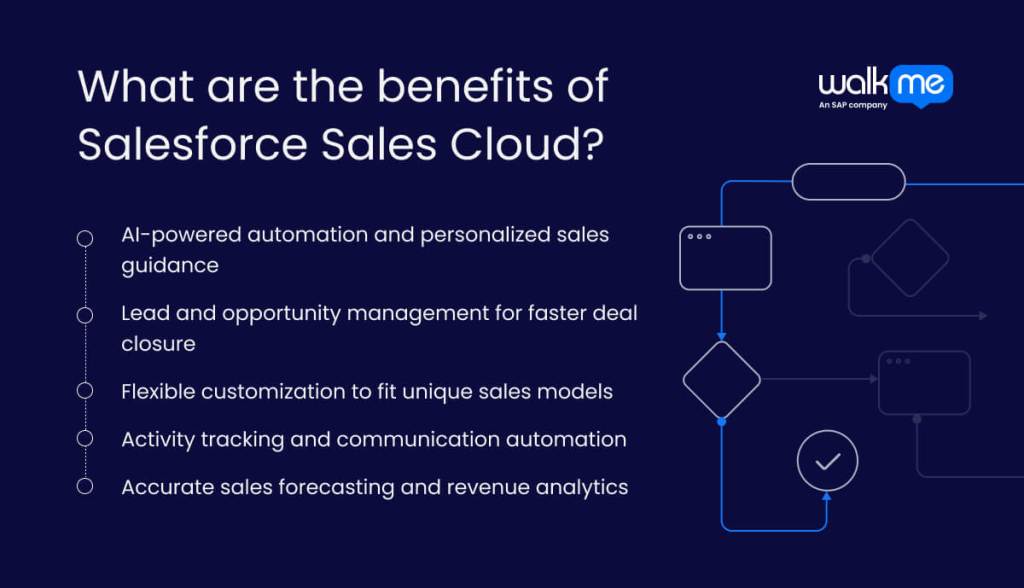Sales teams often spend hours researching industries, finding target accounts, and reaching out to the right people with personalized messages. These sales process steps are time-consuming and mostly manual, even in today’s technology-driven world.
AI and automation platforms are changing that by handling routine tasks, allowing sales reps to focus on more valuable work.
Salesforce Sales Cloud, an example of this type of sales tool, utilizes Einstein AI to automate tasks such as sending follow-up emails, updating records, and generating quotes. It also possesses forecasting and reporting abilities, among others.
This article will explore what Salesforce Sales Cloud is, its key features, benefits, and use cases.
What is Salesforce Sales Cloud?
Salesforce Sales Cloud is a cloud-native platform that enables organizations to manage and enhance their sales processes. It combines customer data from marketing, leads, sales pipelines, customer service, and analytics into a single platform.
The platform can be customized by adding apps from the Salesforce AppExchange or building custom tools.
Employees can access Sales Cloud via a web browser or mobile app. Powered by Salesforce Customer 360, it connects all customer information to provide a clear and consistent view from the first contact.
What are the features of Salesforce Sales Cloud?

Knowing what Salesforce Sales Cloud can do is essential. It helps sales reps use the right tools to track leads, manage their sales work, and close more deals.
Here are the various features of Salesforce Sales Cloud:
Account and opportunity management
Account and Opportunity Management in Salesforce Sales Cloud means tracking your customers and deals. An account is who you’re selling to; an opportunity is the deal you’re working on. Sales Cloud helps manage both, so you stay organized and close deals faster.
Activity management
The Activity Management feature in Salesforce Sales Cloud helps sales teams track tasks, calls, and meetings. It keeps everything organized, allowing them to stay on top of customer interactions and follow up in a timely manner.
Lead management
In Salesforce Sales Cloud, lead management refers to tracking individuals who may become potential customers. It helps you capture their details, follow up with them, and guide them through the sales process. Once a lead is ready to make a purchase, you can convert it into a sales opportunity.
Pipeline management
With Salesforce Sales Cloud, sales teams see and manage the entire sales pipeline in one view, featuring critical data and updates. This makes it easier to track progress and improve sales performance.
Forecast management
Forecast Management in Salesforce Sales Cloud enables users to predict future sales and effectively manage their revenue. It enables companies to create accurate sales forecasts and gain a deeper understanding of their sales process.
Reports and dashboards
Salesforce Sales Cloud utilizes the Reports and Dashboards feature to enable users to make decisions using sales data. Reports provide detailed information from a single source. Dashboards display key numbers and charts from one or more reports.
CRM Everywhere and collaboration
CRM Everywhere in Salesforce Sales Cloud enables you to access your CRM data from any device or application. This helps sales teams stay connected, even when they’re away from the office.
Workflow and process automation
Salesforce Sales Cloud’s Workflow and Process Automation help make work easier by automating repetitive tasks. They allow users to set rules that initiate actions when specific events occur. This saves time and cuts down mistakes.
Quoting and contract approvals
Salesforce Sales Cloud helps create and manage quotes and contracts in collaboration with Salesforce CPQ. It automates pricing and quote creation, keeping contracts organized for easy management and renewal.
What are the benefits of Salesforce Sales Cloud?

Once you are aware of its features, you should understand the outcomes of using Salesforce Sales Cloud effectively. Let’s dive into the details of these Salesforce Sales Cloud benefits:
AI-powered automation and personalized sales guidance
Salesforce Sales Cloud utilizes AI tools, such as Einstein and Agentforce, to streamline the overall sales experience. It automates tasks such as data entry, follow-ups, and pipeline updates, freeing up Salesforce administrators to focus on high-value work.
This type of AI also identifies top leads, scores deals, and generates custom emails or prospect lists. It also offers personalized sales advice by predicting outcomes and suggesting next steps.
Lead and opportunity management for faster deal closure
By automating tasks and managing leads more efficiently, Salesforce Sales Cloud empowers sales teams to close deals more quickly. Using AI, it scores and ranks leads, allowing teams to focus on top prospects. By assigning leads quickly, it reduces delays and improves response times.
Flexible customization to fit unique sales models
Creating a custom sales platform becomes easier with Salesforce Sales Cloud. You can add custom fields or create new objects to track the data your team needs. With digital workflows and approvals, you can automate tasks such as lead routing, report building, and follow-ups.
Activity tracking and communication automation
Tracking sales activities and automating communication are additional features of Salesforce Sales Cloud. With task and event logging, users can record every action in one place.
Sales Cloud also includes an activity timeline, which provides a comprehensive view of past interactions and reports that can enhance sales performance. For instance, Einstein Activity Capture automatically logs emails, saving time and ensuring complete records.
Accurate sales forecasting and revenue analytics
Salesforce Sales Cloud enables businesses to forecast sales more accurately by leveraging real-time data, AI, and custom tools. It shows a clear view of the sales pipeline, including deals, customer actions, and team performance.
With predictive analytics, it examines past trends to forecast future sales and identify issues early. For instance, Sales Cloud automates sales breakdown by region or product, which helps reduce errors and save time.
What are common Salesforce Sales Cloud use cases?
Real-life examples of Salesforce Sales Cloud demonstrate how it can address business challenges and drive sales growth.
These are use cases of Salesforce Sales Cloud that can bring in more revenue over time:
Accelerating lead conversion for internal sales teams
Sales Cloud accelerates lead conversion by automating tasks and tracking leads. It utilizes lead scoring to identify the most promising prospects. Real-time dashboards help monitor progress, while in-built AI tools, such as Einstein, can provide personalized sales tips.
Coordinating complex B2B sales efforts
To manage complex B2B sales in Salesforce Sales Cloud, you can centralize customer data to simplify the sales process and improve teamwork. You can also adopt automation, AI, and mobile tools within the cloud to boost efficiency. Track performance, train teams, and gather feedback to keep improving.
Empowering mobile field sales reps
Sales reps can benefit from Sales Cloud through real-time customer profiles, call scripts, and product information, all of which are accessible on mobile devices. They can also utilize route planning to save time on their travels.
Your business can let them take orders and payments on the spot using Sales Cloud. Ensure they receive technical training and benefit from gamification to enhance performance and motivation in using the platform.
Enhancing forecast accuracy and decision making
Sales Cloud’s Collaborative Forecasting and Einstein tools enable sales teams to make more informed forecasts and decisions. Managers and reps can see real-time data, track progress, and adjust sales plans quickly.
AI tools, such as Einstein Forecasting, predict sales by analyzing past trends and customer behavior. This results in reps receiving help identifying top deals and planning for various scenarios.
Meeting compliance in regulated industries
If your organization is in a regulated industry, Sales Cloud can help you stay compliant by keeping data in one place and automating key tasks. For instance, you can use access controls to ensure that only authorized personnel have access to sensitive data.
It works with other non-native compliance tools to track and manage rules. Sales Cloud can also create reports and send alerts if an issue arises, enabling teams to act quickly and prevent violations.
Enabling scalable, data-driven sales growth with Salesforce Sales Cloud
Salesforce Sales Cloud empowers IT leaders to build robust and scalable sales systems. It comes with built-in automation, AI insights, custom workflows, and tools to track performance. Whether you’re updating legacy applications or launching a digital sales journey, Sales Cloud provides the flexibility and depth necessary to support genuine growth.
By aligning its features with your business objectives, you can enhance sales results and make more informed decisions. The platform also strengthens customer relationships by giving teams better data and tools. Over time, it becomes more than just software—it becomes a partner in building a more successful sales organization.
FAQs
Salesforce Sales Cloud and Service Cloud are both components of the Salesforce platform, serving different purposes. Sales Cloud helps teams manage leads, track sales opportunities, and enhance their sales processes. Service Cloud is designed for customer support. It helps manage service cases and ensures that customers receive the help they need.
Salesforce has six main clouds: Sales Cloud, Service Cloud, Marketing Cloud, Commerce Cloud, Experience Cloud, and Analytics Cloud.

